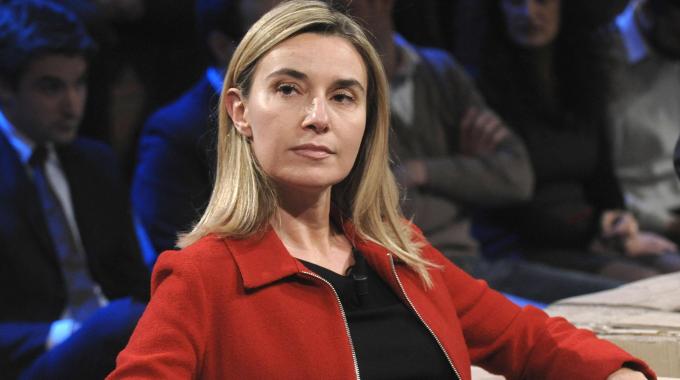Today, we are offering you the possibility to read an interview with Federica Mogherini, new Italian Foreign Affairs Minister. It was earlier this year, 12 January, and Minister Mogherini came in Brussels after Matteo Renzi appointed her as Responsible for Europe and International Affairs for the Democratic Party. “I’m coming more and more frequently,” she said, (perhaps) unaware of how fast her role would have changed.
A month after the primary elections of the Democratic Party, Ms Mogherini held a meeting with the members of the Party of European Socialits (PES), part of the path towards the lauch of the electoral campaign of Martin Schulz, which is going to take place during a congress to be held in Rome in early March. She also met with some of the members of the Brussels Democratic Party association, and with Stefano Sannino, Italian Ambassador at the European Union, to prepare “months of tough work, during an important year for Europe and Italy.”
The Democratic Party enters the PES and rectifies the anomaly of its lack of an European collocation.
“The anamaly has not lasted long, the crucial fact was the adhesion to the S&D group at the European Parliament. In these five years, we had a right and deep discussion in which we tested our coherence with the other members of the socialist family, with a reflection on the added value brought by our reality. This debate allowed us to make a more aware choice.”
Now, Italy will be the starting point of Schulz’ electoral campaign.
“This choice is rooted in our common past. Schulz and Italy share a long-time friendship, and his choice of Rome for the launch of his campaign, maybe the most significative one of the decade, is a remarkable acknowledgement for both our country and our party.”
Still, Italy is under close watch by the Union.
“We made important steps toward the rebalancing of public accounts, you know, ‘we made our homeworks’ but there’s much more left. Our credibility has grown, however, and that is due to the last two governments and to the increased reliability of our Parliament.”
Renzi has already met Angela Merkel during a so-called “private” meeting.
“That travel was made when he was not the Head of the Party, hence it was not ‘political’. Yet, it underlines the possibility, capability and will he has of being a leader at European level. In March we’ll define the details of this new approach, but we want to make citizens understand that Europe is not an ‘international’ dimension, it is ‘just’ overlapping the national one, as the national dimention overlaps the regional one. We need to change the cultural approach to Europe.”
Yet Brussels is not very appreciated among citizens, and sometimes they are right in having little trust.
“If lots of citizens became eurosceptics, it is also because of twenty years in which the managing and political leading class has said it was ‘Europe’s fault’ even when it was theirs. National governements, even the Italian one, took their decisions and then said it was Europe’s fault – as they were not involved in the decision-making.”
Well, what do you think it is necessary then?
“We need to tell citizens what Europe is, it is not all about angels and demons. It is a reality which have helped us in numerous ways – and still helps us. I think about peace, a thing we now undervalue but which has a primary importance. Let’s think about fYROM, for instance. Nowadays, those countries, former enemies, are entering the Union or are already Member States. Then, the freedom of movement, the rights for consumers…”
And then, there is austerity.
“And then there are mistakes, which governments have been doing when they were trying to face the economic crisis, since 2008. Slow choices, sometimes insufficient, sometimes wrong, never neutral. Political choices made by political governments which must assume their responsibility on them. In Italy we have adopted forward-looking choices, economically speaking, we have adopted austerity as leading value. Now it is time to work on development and growth, to create jobs and exit this crisis.”
The first approval for the Jobs Act, proposed by Renzi, came from Lazlo Andor, EU Commissioner for Employment, Social Affairs and Inclusion.
“We were particularly satisfied by the comment: we like to consider ourselves as truly Europeans, we are a ‘Euroepan political class’ and we will show our committment in the policies we are implementing.”
Renzi said the 3 percent limit of the deficit/GDP ratio is “outdated”.
“Renzi said two things. First, we need to keep our accounts in order, reducing our debt – the real issue of the future – and this is a value in itself, something we must do for our children and grandchildren. He also added that Italy, together with other countries, shall put on the European table the matter of flexibility: certain criteria needs to be flexible, because together with austerity we need investment for growth. We need to bet on green and digital economy, on research, for instance. These are the issues on which Europe needs to bet. These are the issues to be discussed by the new European Parliament and Commission.”
With the new European Parliament and Commission, Italy will have to lead the Union during his Presidency semester.
“It will be a particularly delicate semester, and we will be able to judge its importance only after the European Parliament election outcome. For sure, after five yearsin which we had to deal with the crisis, we will need to have years devoted to growth. And Italy will play a major role.”
Alfonso Bianchi



![Una donna controlla le informazioni sul cibo specificate sulla confezione [foto: archivio]](https://www.eunews.it/wp-content/uploads/2014/12/Etichette-alimentari.jpg)


![Ragazza in biblioteca. Nell'Ue chi studia non lavora e neppure cerca. In Italia funziona ancor più così [foto: Tulane University, Wikimedia Commons]](https://www.eunews.it/wp-content/uploads/2024/11/Girl_in_the_Library_3638661587-350x250.jpg)



